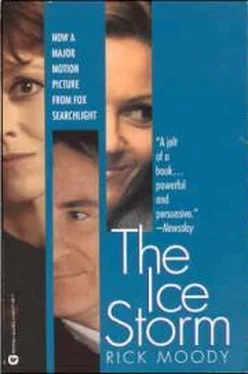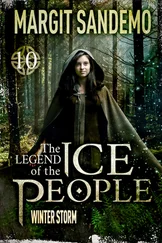In the midst of this drama, Wendy’s brother called.
— Weather reports are bad, he said, like much snow and sleet and frozen highways and byways.
Wendy hadn’t heard anything of the kind. But the snow was already falling.
— Well, you think I should come home now? Or should I wait until, you know, the absolutely last train out of Grand Central, which would be like maybe ten after eleven?
She told him they were out and that guessing from her dad’s condition they weren’t gonna wait up for Paul. They would fall into bed swiftly and permanently. Which meant no car service, no car service from the station. He could take a taxi. He could come back whenever he wanted.
— The thing is, Wendy said, you’re not being watched. Take a cab.
— No one believes in the weather anymore, Paul said. He asked what she was doing and she described in detail the inside of the woman’s buried-alive coffin and her strangled, desperate screams. Wendy even simulated a scream, a little yelp of confinement.
— But you know she’s the mother from Please Don’t Eat the Daisies, Wendy said, or one of those, Ghost and Mrs. Muir, so it’s not like she’s incredibly scary or anything.
— You mean to say you are just gonna hang around the house on a Friday night when school’s out?
— I’ve got plans, Wendy said.
Abruptly, Paul called her baby doll and signed off. It happened all at once. There was a lonesome sound to his farewell, and it reminded her of the way her father would never say good-bye on the phone, the way he hastened to disconnect first.
Wendy wanted to tell Paul she missed him, that she had survived the long, painful stretches of junior high with tales of his good life away from home. Though she had sent him this letter one time, this letter explaining her feelings, she was never sure if it had been received. She thought Paul got all the breaks. He was the smarter one, the badly adapted one. There was no discussion of her being sent away, too. Wendy was a beauty, a pixie, a nymph, a sorceress, but she wasn’t going to be any captain of industry. She could work the rooms of the P.T.A. Paul got sent away back at some moment when Valley Road was different, when family life was different, when there was movement between the generations, when there was exchange of sentiment and gifts and ideas and stories. Or that’s how Wendy thought sometimes. It was pretty obvious, actually, that no such time had ever existed.
In an interminable commercial break, Wendy gathered up the blanket and set out about the unheated and unlit portions of the house, looking for a sweater she’d left down here somewhere. She surveyed the exposed beams and warped floors, the masonry and wrought-iron latches of historic construction. The house was as cold as a tomb. The ghost of Mark Staples, repressive Episcopal minister and one-time owner of 129 Valley Road, tracked her movements. As Wendy imagined him, he was a Chiller Theater ghost, a flapping white sheet, with strings exposed and tennis shoes peaking from beneath. He was so like a Hood — so trapped in indecision, so glum, such a professional humbler — that he was the perfect ghost for them, the perfect ancestor. She could feel his Halloween exoskel-eton girding her. She was creeped out. Forget her sweater. It was lost. She didn’t need it.
The decision to head back to the Williamses came soon after this tour. She foolishly settled in to watch first the grasping hand, and then the arm, of the buried woman from Please Don’t Eat the Daisies struggling up from beneath the surface of her tomb. A team of policemen and paramedics were racing toward the spot where she was buried — they had been tipped off somehow. In the meantime, in the woman’s back brain, in the most obscure recesses of cognition, she had effected an escape. Her hands, independent of the rest of her, pushed up through soft earth, grasping.
In a malevolent dusk, the buried woman stood now on a narrow spit of earth, shreds of some Beverly Hills evening gown barely concealing her transparent flesh. Shroud of Turin. What was left of her, as she reached out, covered with shit and pitch and dirt? The trauma had lodged in this woman, Wendy thought, the way a germ lodges in a dead body, to begin its fervent decomposition. The trauma might be wrestled into a repose, at a place like Silver Meadow, but it was never going to disappear.
Wendy had on her poncho and her skintight ski pants before the credits were even rolling. Her imagination had gotten the best of her. She needed a change. Her imagination wheeled around the house like an additional poltergeist. Wendy wanted to read Nancy Drew and have training wheels. She wanted deviled ham on white bread or sloppy joes or Twinkies. She wanted a mom who said that soup was good food and who reminded her to chew each bite thirty-two times. She wanted the basic food groups and a program of fitness. She wanted a childhood in which she was a kid.
The storm was in its second phase. Like wage-and-price controls. The methodical roar of the wind leveled out all unusual night sounds. The whole environment, the ecosystem, had become this one thing. Wendy felt she was at the center of it as she walked up the driveway, that she was the last girl on earth, that God had selected her and New Canaan as the center of His attention. The trees were doubled over, weary with wind and ice. The snow fell like jagged hunks of glass onto crusty, sheer surfaces. Wendy sank through the rippling, drifting expanses of crystallized stuff halfway to her knees. The crust scored her ankles and calves, drenched through the layers of her socks.
On the main roads, the state of emergency cranked itself up. The mechanized and hydraulic progress of plows and sanding and salting vehicles was somber and methodical. Their lights lingered in the air like the afterglow of bombardment. Wendy could walk in the narrow tracks of these vehicles without coming upon any other fearless traveler. Up the hill, she passed back over the path she had already marked out twice that day. Past Silver Meadow.
She called Mike’s name at the Williamses’ front door. Called it lustily and desperately. Called it as though she were pronouncing the exact whereabouts of her most secret longitudes. Called it as though if she were alone another minute she would have to be dragged down the road to the hospital and straitjacketed. She beseeched, she argued. No answer came. But the door was open and the front hall invitingly lit. She entered and crept around the house room by room. She was curious like any kid her age. She searched for Mike around the dining room table, in the living room, out on the patio — Mrs. Williams seemed to have given up halfway the process of moving her house-plants in for the winter. She looked for him in the kitchen, and stole a pair of Devil Dogs from the counter. Then she took a spin through the basement, searching in vain for Mike through the intricate architecture of Bazooka crates. The site of that afternoon’s disgrace had a bracing and shameful effect.
Then she headed for the stairs.
Mike’s trick buzzer greeted her as she reached for his doorknob. It broke the timeless quiet of the house. The hall light was on, but the place was empty. Wendy tried the door again, it buzzed again, and then she just pushed through the noise and opened the door six inches. Mike was turned away in his bed, curled over a pillow as if he had been humping it. Wendy flung back the door and without warning jumped the sleeping figure, flew like a banshee across the room haloed by her blond mane — only to find that it wasn’t Mike at all, but some pajamas stuffed with dirty T-shirts and B.V.D.’s and sweat socks. What a joker. He’d pulled that cartoon thing. He’d made a dummy of himself.
Читать дальше












